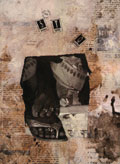April 1996. Editor: Anjum Katyal
Ananda. A word I encountered in unexpected contexts. In a tiny, cramped room on the slushy banks of a narrow, dirty strip of water, beside a heap of garbage. The Kalighat redlight district, where a few women gathered to speak to us about a theatre workshop experience they had had some six months previously. 'What did you get out of it? How did you like it?' 'Amra ananda pelam.' Joy. 'It gave us joy.' 'I can't imagine living without it now. Natak is my life' -Jana Sanskriti theatre worker. 'She works through the night, cooks, everything, so that her share of the chores are done, so that her family can't point a finger at her for neglecting anything-and then she comes to take part in the natak'-fellow Jana Sanskriti theatre worker. Joy. Healing. Fun. For women who are denied one, a voice. A sense of power to Empowerment. Visibility. Recognition. A space she can claim; a space where she is listened. None of the women in this issue use this word as they relive and reflect upon their work in theatre; but it is the unspoken subtext of their verbalized experience. Regardless of their socio-economic background, age or education. Theatre has the potential to empower. What lies between these pages proves that.
CONTENTS
'Amra Ananda Payi': Theatre and the sex workers of Kalighat
A documentation
The Monkey Dance: A Playscript
Malini Bhattacharya
'A coming together: an affirmation; a sharing'
Kulavai: A Report
Anjum Katyal
Two performance poem/texts
C.S. Lakshmi (Ambai)
In her own words: Actresses speak
Cultural Activism and the Women's Social Movement
Jyoti Mhapsekar
'When You Show It Through A Play...The Message Goes Straight To Their Hearts'
An interview with Sakhi Kendra
Theatre Log
Festival of Choreographic Works, Bangalore
Sushama Nagarkar
International Women's Day Forum, 1996
Jhuma Basak
Calcutta Theatre Roundup
Nibeta Kar Gupta
